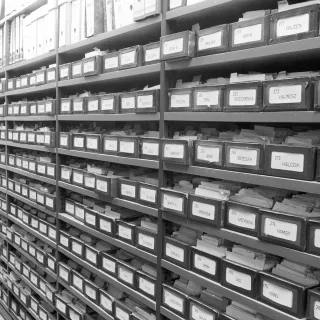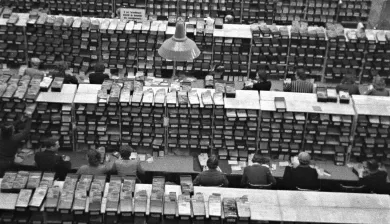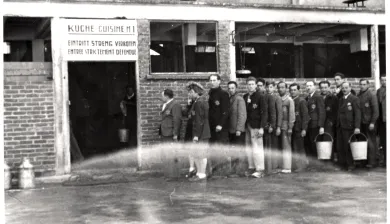About the ICRC Archives
General archives
The ICRC's general archives are composed of institutional, operational, and diplomatic files documenting the history of the ICRC, its development, activities, and the missions that were undertaken since 1863. They are the indispensable go-to for researchers in the field of humanitarianism, the history of armed conflicts and the development of international humanitarian law.
Please note that the general archives up to 1975 are currently open to visitors and by prior appointment only due to limited capacity. Prepare your visit by consulting the inventories in the ICRC archives catalogue.
Opening hours
Monday to Thursday from 8:30am to 4:30pm
On arrival, please report to the ICRC’s reception with official photographic proof of your identity, such as a passport, permit or photocard driving licence.
Please respect the reading room rules and note that the service is closed for two weeks during the holiday season (December-January).
Address
ICRC Archives
International Committee of the Red Cross
19 avenue de la Paix
1202 Geneva,
Switzerland
Tracing archives (personal records)
The Central Tracing Agency (CTA) is one of the oldest institutions of the ICRC and enshrined in the Geneva Conventions. The personal records in the CTA’s archives consist of millions of index cards and lists collected by the ICRC about people affected by armed conflict and other situations of violence, natural disasters, migration and other emergencies.
Ever since the Franco-Prussian War in 1870, the ICRC has set up various Agencies to collect and centralize information from governments and their National Information Bureaus, National Red Cross and Red Crescent Societies, and sometimes directly by the persons about whom this information is collected, and who are: prisoners of war; civilian internees; missing soldiers and civilians; separated families; unaccompanied children; and other beneficiaries. This work plays a crucial role in restoring family links and facilitating the exchange of news among family members, thereby alleviating the “moral suffering” caused by conflicts:
- First World War: visit the ICRC's digital archives on individuals from the First World War.
- Spanish Civil War and Second World War: more information on how to seek informations about a person - military or civilian - detained during the Spanish Civil War or the Second World War.
- Current armed conflicts and other situations of violence: to trace people caught up in current conflicts and other situations of violence, visit the Restoring Family Links website.
Audiovisual archives
The ICRC's audiovisual archives of photographs (1850-), films/videos (1921-) and sound recordings (1953-) are continuously enriched and document the work of the ICRC and other components of the International Red Cross and Red Crescent Movement. They are an essential source for the ICRC’s communication and serve as a key reference for historical research on the ICRC, humanitarian action, international humanitarian law, and international relations.
They preserve the institution's memory through images and sound and in this sense complement the ICRC’s textual archives (see above).







